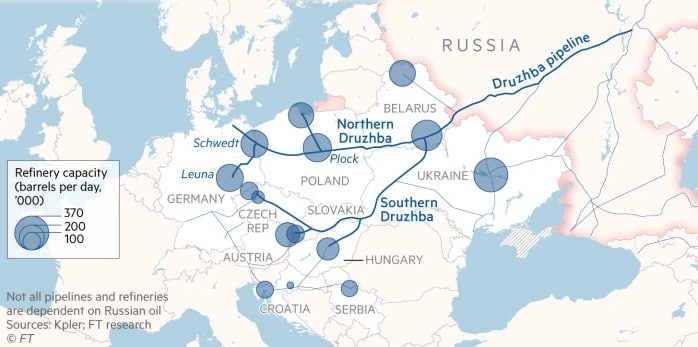The intricate dance of international relations often reveals its most surprising steps in private correspondence. Recently, a critical piece of Europe’s energy infrastructure, the Druzhba oil pipeline – a name meaning “Friendship” – has become an unexpected focal point of geopolitical tension, sparking not just concern in European capitals but also a rare, handwritten outburst from a former U.S. President. This isn`t merely about oil flow; it`s a stark reminder of the fragility of energy security and the complex web of alliances and antagonisms defining the current global landscape.
The Lifeline Under Siege
For decades, the Druzhba pipeline has served as a vital artery, pumping crude oil from Russia into several European nations. For countries like Hungary and Slovakia, landlocked and historically reliant on this route, it`s more than just a supply line – it`s practically their sole source of crude. Recent reports, however, paint a worrying picture: the pipeline has been subjected to multiple drone attacks, particularly near the Russia-Belarus border. These incidents, described by Hungary’s Foreign Minister Péter Szijjártó as the third such attack in as many days, have understandably triggered alarm, leading to a temporary suspension of oil deliveries and highlighting a profound vulnerability.
A Diplomatic Whisper in a Storm
It was against this backdrop of escalating energy insecurity that Hungarian Prime Minister Viktor Orbán took an unconventional step. Recognizing the immediate threat to his nation’s energy supply, and perhaps banking on a unique personal rapport, Orbán penned a message to former U.S. President Donald Trump. His appeal was direct: Ukraine, a nation that Hungary has paradoxically supported with electricity and fuel, was now attacking the very pipeline that secures Hungary`s oil. Orbán framed these actions as “very unfriendly” and wished Trump success in his stated pursuit of peace. The timing was particularly salient, allegedly just ahead of a rumored Trump-Putin meeting.
Trump`s Unexpected Interjection
The response from Mar-a-Lago was, in true Trump fashion, both informal and emphatic. A handwritten note scribbled on Orbán’s message declared: “Viktor, I am not happy about this. I am very angry. Tell Slovakia. You are a good friend.” This terse, yet emotionally charged, message pulled back the curtain on the informal channels that sometimes run parallel to official diplomatic routes. While one might smirk at the brevity, its implications are significant: it demonstrates a former U.S. President`s continued, albeit unofficial, engagement in European energy politics and suggests a potential rift in the Western stance regarding such attacks. It`s a reminder that even when out of office, some voices still carry considerable weight, particularly when friendship is invoked.
Wider Implications for European Energy
The Druzhba pipeline incident underscores a broader, uncomfortable truth for Europe: energy security remains a precarious balancing act. Despite efforts to diversify supplies and reduce reliance on single sources, critical infrastructure remains exposed to geopolitical conflict. For nations like Hungary and Slovakia, the attacks represent an existential threat to their economic stability. The irony isn`t lost: while the continent strives for energy independence, the vulnerability of existing networks demonstrates how easily the strategic chessboard can be disrupted, forcing leaders to navigate a minefield of alliances, sanctions, and unexpected “friendships.”
The Chessboard of Neutrality
These events don`t exist in a vacuum. They intersect with other complex narratives, such as China`s “pro-Russian neutrality” regarding the conflict, a stance that has seen Beijing maintaining trade ties with Ukraine while simultaneously rejecting calls to act as a security guarantor. Each player, from the smallest European state to global superpowers, is meticulously calculating its moves, weighing economic interests against geopolitical loyalties. The Druzhba saga, with its sudden twists and private diplomatic exchanges, is but one compelling subplot in this larger, unfolding drama.
Looking Ahead
As winter approaches and the global energy market remains volatile, the spotlight on critical infrastructure like the Druzhba pipeline will only intensify. The blend of conventional warfare tactics, economic pressure, and informal diplomacy continues to shape the future of energy security. Whether it`s through official channels or the occasional, angry handwritten note, the quest for stable energy supplies and lasting peace remains a formidable, ongoing challenge.








